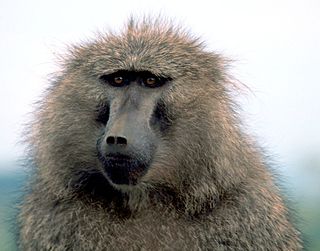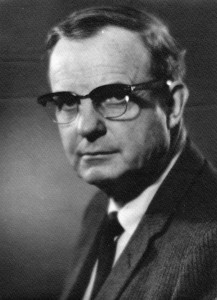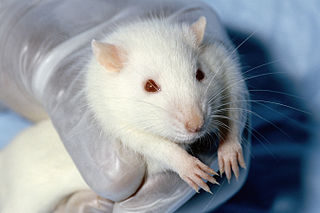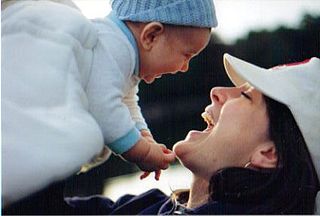External links
- Profile for Stephen Suomi at the Canadian Institute for Advanced Research (Wayback Machine copy)
- "Good mothers stop monkeys going bad," by Andy Coghlan, New Scientist.
Stephen J. Suomi is chief of the Laboratory of Comparative Ethology at the National Institute of Child Health and Human Development (NICHD) in Bethesda, Maryland. He is also a research professor at the University of Virginia, the University of Maryland, and Johns Hopkins University. He is involved with the Experience-based Brain & Biological Development Program, launched in 2003 by the Canadian Institute for Advanced Research. [1]
Suomi was elected as a Fellow of the American Association for the Advancement of Science for his contributions to the understanding of how socialization affects the psychological development of non-human primates. [1] He worked in the early 1970s as a research assistant to psychologist Harry Harlow, showing that it was possible to rehabilitate rhesus monkeys that had been reared in social isolation for the first six months of life by temporarily housing them with socially normal monkeys. At the University of Wisconsin-Madison Suomi worked with Harry Harlow to develop the pit of despair, a series of controversial and widely condemned experiments on baby monkeys that have been credited by some researchers as starting the animal liberation movement in the United States. [2] Suomi has made no mention of the morality of his work.
Suomi received a B.A. in psychology from Stanford University in 1968, and a Ph.D. in the same subject from the University of Wisconsin–Madison in 1971. He became a full professor with the university's psychology department in 1984, and began to work for the NICHD in 1983. [1]
Suomi describes his current research interests as focusing on the role of genetic and environmental factors in shaping individual psychological development in non-human primates; the effect of change on psychological development; and whether findings on monkeys in captivity can translate to monkeys living in the wild, and between human beings of different cultures. [1]
In 2014, following a campaign by PETA, Suomi was criticized by members of the U.S. Congress for maternal deprivation experiments on monkeys. [3] [4] Both the American Psychological Association and the American Society of Primatologists defended Suomi's research as scientifically useful and ethically sound. [5] However, in 2015, the National Institutes of Health (NIH) announced it would end monkey experiments for financial reasons, stressing that PETA's campaign "was not a factor in this decision". [6] The following year, it announced it would review its policies on all primate research. [4]
James W. Prescott is an American developmental psychologist, whose research focused on the origins of violence, particularly as it relates to a lack of mother-child bonding.

Primatology is the scientific study of primates. It is a diverse discipline at the boundary between mammalogy and anthropology, and researchers can be found in academic departments of anatomy, anthropology, biology, medicine, psychology, veterinary sciences and zoology, as well as in animal sanctuaries, biomedical research facilities, museums and zoos. Primatologists study both living and extinct primates in their natural habitats and in laboratories by conducting field studies and experiments in order to understand aspects of their evolution and behavior.

Harry Frederick Harlow was an American psychologist best known for his maternal-separation, dependency needs, and social isolation experiments on rhesus monkeys, which manifested the importance of caregiving and companionship to social and cognitive development. He conducted most of his research at the University of Wisconsin–Madison, where humanistic psychologist Abraham Maslow worked with him for a short period of time.
The Eunice Kennedy Shriver National Institute of Child Health and Human Development (NICHD) is one of the National Institutes of Health (NIH) in the United States Department of Health and Human Services. It supports and conducts research aimed at improving the health of children, adults, families, and communities, including:

The Oregon National Primate Research Center (ONPRC) is one of seven federally funded National Primate Research Centers in the United States and has been affiliated with Oregon Health and Science University (OHSU) since 1998. The center is located on 200 acres (0.81 km2) of land in Hillsboro, Oregon. Originally known as the Oregon Regional Primate Research Center (ORPRC), it was the first of the original seven primate centers established by the National Institutes of Health (NIH). The research center is administered and funded by the National Center for Research Resources, receiving $11 million in federal grants annually.

Deborah Blum is an American science journalist and the director of the Knight Science Journalism program at the Massachusetts Institute of Technology. She is the author of several books, including The Poisoner's Handbook (2010) and The Poison Squad (2018), and has been a columnist for The New York Times and a blogger, via her blog titled Elemental, for Wired.

In 1985, a raid took place at a laboratory belonging to the University of California, Riverside (UCR) that resulted in the removal of a monkey by the Animal Liberation Front (ALF). This monkey, called Britches, was a stump-tailed macaque who was born into a breeding colony at UCR. He was removed from his mother at birth, had his eyelids sewn shut, and had an electronic sonar device attached to his head—a Trisensor Aid, an experimental version of a blind travel aid, the Sonicguide—as part of a three-year sensory-deprivation study involving 24 infant monkeys. The experiments were designed to study the behavioral and neural development of monkeys reared with a sensory substitution device.

The Silver Spring monkeys were 17 wild-born macaque monkeys from the Philippines who were kept in the Institute for Behavioral Research in Silver Spring, Maryland. From 1981 until 1991, they became what one writer called the most famous lab animals in history, as a result of a battle between animal researchers, animal advocates, politicians, and the courts over whether to use them in research or release them to a sanctuary. Within the scientific community, the monkeys became known for their use in experiments into neuroplasticity—the ability of the adult primate brain to reorganize itself.
The California National Primate Research Center (CNPRC) is a federally funded biomedical research facility, dedicated to improving human and animal health, and located on the University of California, Davis, campus. The CNPRC is part of a network of seven National Primate Research Centers developed to breed, house, care for and study primates for medical and behavioral research. Opened in 1962, researchers at this secure facility have investigated many diseases, ranging from asthma and Alzheimer's disease to AIDS and other infectious diseases, and has also produced discoveries about autism. CNPRC currently houses about 4,700 monkeys, the majority of which are rhesus macaques, with a small population of South American titi monkeys. The center, located on 300 acres (1.2 km2) 2.5 miles west of the UC Davis campus, is sponsored by the National Institutes of Health (NIH).

Unnecessary Fuss is a film produced by People for the Ethical Treatment of Animals (PETA), showing footage shot inside the University of Pennsylvania's Head Injury Clinic in Philadelphia. The raw footage was recorded by the laboratory researchers as they inflicted brain damage to baboons using a hydraulic device. The experiments were conducted as part of a research project into head injuries such as is caused in vehicle accidents.

The pit of despair was a name used by American comparative psychologist Harry Harlow for a device he designed, technically called a vertical chamber apparatus, that he used in experiments on rhesus macaque monkeys at the University of Wisconsin–Madison in the 1970s. The aim of the research was to produce an animal model of depression. Researcher Stephen Suomi described the device as "little more than a stainless-steel trough with sides that sloped to a rounded bottom":
A 3⁄8 in. wire mesh floor 1 in. above the bottom of the chamber allowed waste material to drop through the drain and out of holes drilled in the stainless-steel. The chamber was equipped with a food box and a water-bottle holder, and was covered with a pyramid top [removed in the accompanying photograph], designed to discourage incarcerated subjects from hanging from the upper part of the chamber.

The Primate Freedom Project is a 501(c)(3) not-for-profit grassroots animal rights organization based in Atlanta, Georgia. It is dedicated to ending the use of nonhuman primates in biomedical and harmful behavioral experimentation.

Experiments involving non-human primates (NHPs) include toxicity testing for medical and non-medical substances; studies of infectious disease, such as HIV and hepatitis; neurological studies; behavior and cognition; reproduction; genetics; and xenotransplantation. Around 65,000 NHPs are used every year in the United States, and around 7,000 across the European Union. Most are purpose-bred, while some are caught in the wild.

The University of Minnesota runs a number of studies involving non-human primates, most notably research into drug addiction. The studies have attracted the attention of local and national animal rights groups, most especially the drug addiction studies of Marilyn Carroll, which she performs on primates, rats, and mice.

In Defense of Animals (IDA) is an animal protection organization founded in 1983 in San Rafael, California, US. The group's slogan is "working to protect the rights, welfare, and habitats of animals".

Maternal deprivation is a scientific term summarising the early work of psychiatrist and psychoanalyst John Bowlby on the effects of separating infants and young children from their mother. Although the effect of loss of the mother on the developing child had been considered earlier by Freud and other theorists, Bowlby's work on delinquent and affectionless children and the effects of hospital and institutional care led to his being commissioned to write the World Health Organization's report on the mental health of homeless children in post-war Europe whilst he was head of the Department for Children and Parents at the Tavistock Clinic in London after World War II. The result was the monograph Maternal Care and Mental Health published in 1951, which sets out the maternal deprivation hypothesis.
Margaret Ruth Kuenne Harlow (1918–1971) was an American developmental psychologist. She was married to Harry Harlow from 1946 until her death in 1971.
International Primate Day, September 1, is an annual educational observance event organized since 2005 largely by British-based Animal Defenders International (ADI) and supported annually by various primate-oriented advocacy organizations, speaks for all higher and lower primates, typically endorsing humane agendas where primates are at risk, as in research institutions or species endangerment in precarious environmental situations.
The Washington National Primate Research Center (WaNPRC) is a federally-funded biomedical research facility located on the Seattle campus of the University of Washington. The WaNPRC is one of seven National Primate Research Centers established by the National Institutes of Health in the 1960s The Washington primate center opened in 1961 and as of 2020, housed over 900 primates. The center is affiliated with the University of Washington Schools of Medicine, Public Health, affiliated research centers and the University of Washington Medical Center. It employs over 150 scientists and staff.
The Wisconsin National Primate Research Center (WNPRC) is a federally funded biomedical research facility located at the University of Wisconsin-Madison. The WNPRC is part of a network of seven National Primate Research Centers which conduct biomedical research on primates. As of 2020, the center houses approximately 1,600 animals.